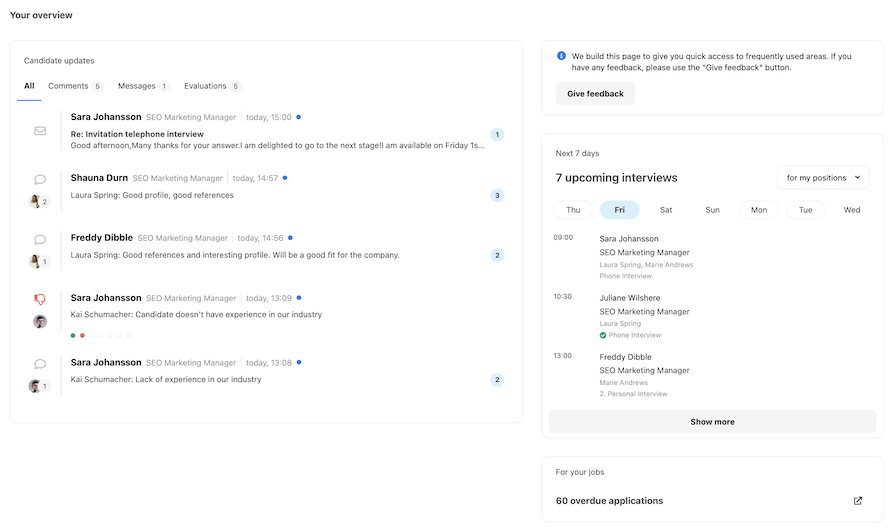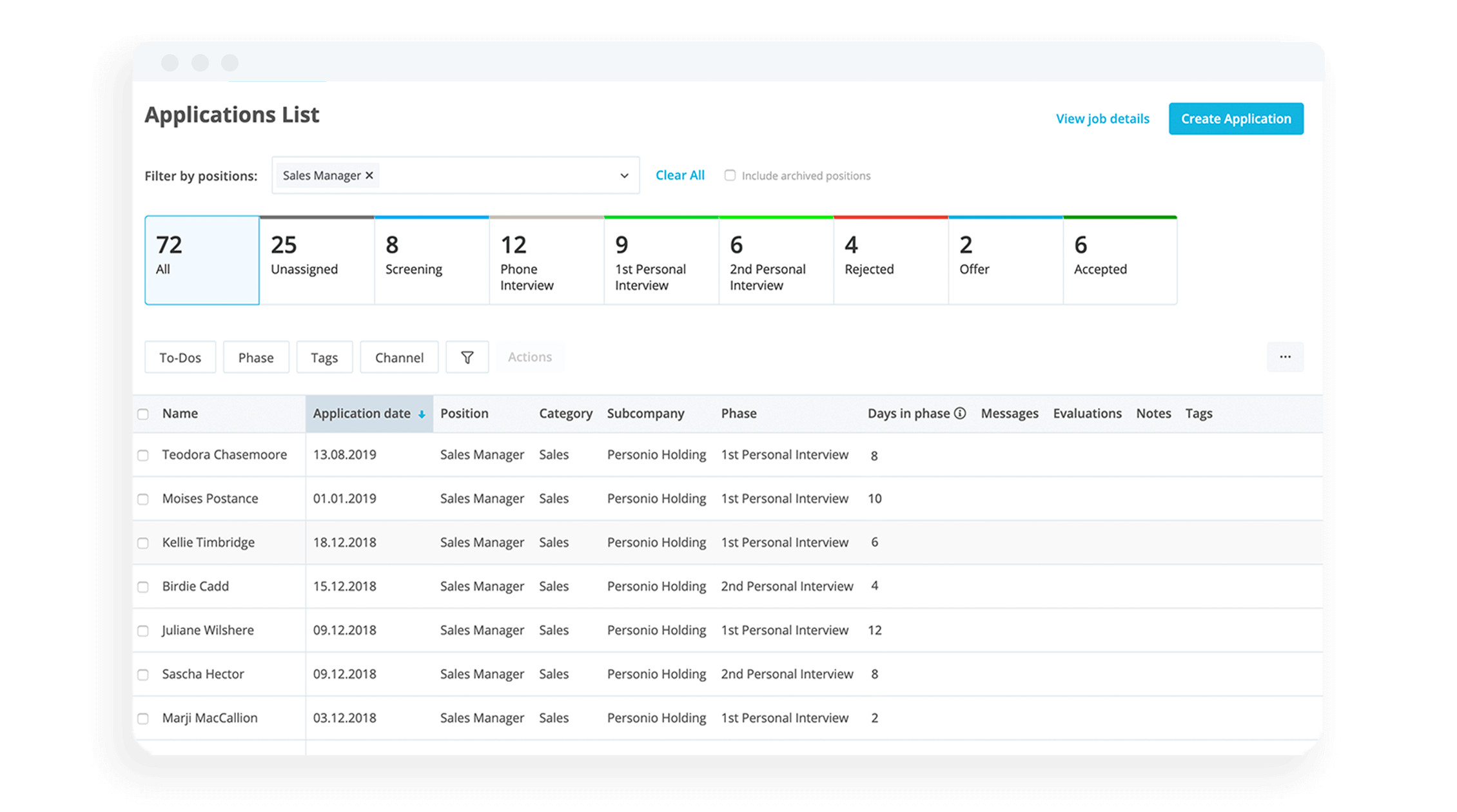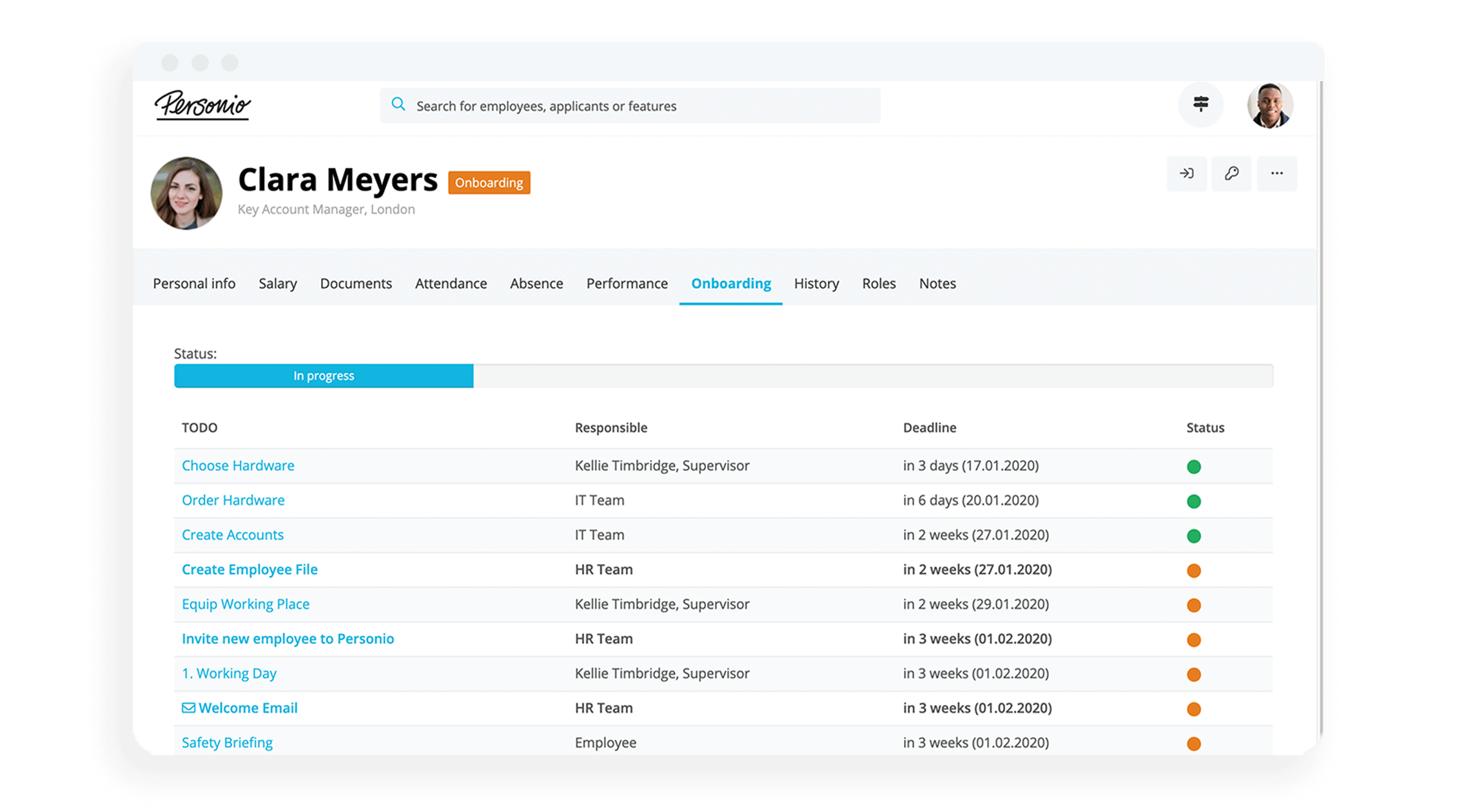
Optimise recruitment workflows
Optimise your recruitment workflow with Personio's powerful recruitment software.
Explore our productRecruiter Tools to Help You Hit Your Hiring Goals

Finding the perfect candidate for a role is a lot of work for a recruiter or hiring team — especially if you don’t have the right tools. Thankfully, there’s multiple apps, programmes and software solutions that can help streamline almost every stage of the recruitment process.
Read on for our full guide to the recruiting tools you need to know about.
Key facts:
Recruiting tools make the recruiting process easier and more efficient for recruiters, allowing them to spend more time building relationships with candidates and hiring managers.
There are many different recruitment tools available, which each help with different parts of the recruitment process.
If you’re deciding which recruitment tools to use, you need to look at your processes to determine where a piece of software would be useful. It’s also a good idea to look for software that performs multiple functions (like Personio).
What Are Recruiting Tools?
Recruiting tools are software tools that help recruiters and HR teams save time while hiring top candidates. There are many types of tools available, and most recruiters use several different ones to help with different parts of the recruitment process.
As well as helping recruiters streamline their processes, recruiting tools can help create a smoother and more pleasant experience for both candidates and hiring managers.
What Are the Advantages of Using Recruiting Tools?
Here are some of the advantages of using recruiting tools:
Time and Cost Savings
Recruitment tools can take on a lot of the repetitive tasks and processes that recruiters would otherwise have to perform manually. For example, some software can parse CVs, perform background checks or even communicate with candidates on your behalf.
This means that recruiters are able to spend more time doing things that require a human touch — like building relationships with candidates and hiring managers.
Enhanced Efficiency
Recruitment tools like applicant tracking systems and CRM systems give recruiters access to all the information they need about the recruitment process in one place. Naturally, this is much more efficient than having to search for information across several different platforms.
It’s also particularly useful when several people are involved in the recruitment process. The recruiting tool acts as a single source of truth that the various stakeholders can rely on, leaving less room for errors or miscommunications.
Improved Candidate Experience
Candidate experience matters. Using recruiting tools can make the process of applying for a job much smoother for candidates — while saving recruiters time. For example, some tools allow you to automate communication with candidates.
This means you can easily keep candidates in the loop about the next stages in the process, without creating extra work for yourself.
Data-Driven Decision-Making
The recruitment process involves gathering a huge amount of data — and some tools can help recruiters to harness that data and use it to make better decisions.
For example, recruiters can use applicant tracking systems and CV parsing tools to automatically shortlist candidates, saving hours compared to doing it manually.
Some recruiting software can also help you to spot trends and patterns in your past recruitment data, giving you a better idea of which candidates and sourcing tactics are more likely to be successful.
For example, Personio’s recruiting tools give you insights as to which job boards are performing best for your organisation, so you can allocate your budget more effectively.
Compliance and Reporting
Recruiters need to store data about past and present candidates — and they have a responsibility to keep that data safe. That means that simply storing information in a shared spreadsheet (or worse, a physical file) might not cut it.
Recruitment software comes with the necessary security credentials to ensure you’re compliant with whichever laws and best practices are applicable in your location.
For example, organisations recruiting candidates in the UK and the EU need to be compliant with the General Data Protection Regulation, or GDPR.
Turn Top Talent Into Your Next Great Hire

Speed up your entire recruiting and hiring process with Personio. See how it works below.
Hiring At Scale With PersonioTypes of Recruitment Tools
New recruitment tools are constantly being developed. That means there’s a lot to keep up with if you’re new to the world of recruitment (or just haven’t updated your tech stack in a while).
Let’s take a look at some of the most important categories of recruitment tools that could help you to optimise your processes.
Applicant Tracking Systems (ATS)
An applicant tracking system (ATS) is a piece of software that helps recruiters track candidates as they move through the recruitment process. This type of software ensures everyone involved in the recruitment campaign is on the same page and has all the information they need.
Since ATS software helps to streamline the recruitment process, this can also help create a smoother and more positive candidate experience.
Job Boards and Career Websites
Even if you’re new to the world of recruitment, you’ve probably heard of some of the more well-known job boards like Indeed, Monster and LinkedIn. You might even have used one to apply for a job yourself.
Put simply, job boards allow companies to post adverts for open positions. Candidates can search the sites and apply for the jobs that appeal to them, and the hiring company or recruiter automatically receives applications as they come in. Some job boards go one step further, and pre-screen candidates for the relevant skills before passing their details on to the company.
There are also other types of recruiting software that can help you use job boards more effectively. For example, using Personio, you can post to up to 600 online job boards in just a few clicks — which saves a lot of time compared to doing it manually.
CV Parsing Tools
If you’ve ever had to manually sort through a huge pile of CVs, you’ll know how valuable CV parsing software can be. Tools like Personio can search large numbers of CVs in a few minutes or less, cutting hours of admin from a recruiter’s workload.
Since they can quickly determine which candidates have the right skills, experience and qualifications for a role, they can also ensure you don’t waste time interviewing candidates who aren’t a good fit.
Social Media Platforms
We don’t usually think of social media platforms as a recruitment tool — but more and more recruiters are using them to source candidates. The most obvious example is LinkedIn, which is a platform meant specifically for professional networking.
This makes it a good place to start when sourcing candidates through social media — but it’s not the only recruiting tool in this category. Some recruiters source candidates through less traditional channels, like Facebook, Instagram and even TikTok.
Background Screening Tools
Recruiters and hiring organisations sometimes need to perform background checks on people they’re considering employing — particularly in highly regulated industries. Since performing these checks manually would take hours (if it was possible at all), most of them turn to software tools to streamline the process.
Some of the most well-known companies offering background checks for recruitment include Checkr, Accurate Background and IntelliCorp. These companies can help recruiting teams perform reliable, efficient and legal background checks that give them the confidence they need to move forward with an offer.
Analytics and Reporting Tools
Analytics and reporting tools can help recruiters to hone their processes and make them as efficient as possible. For example, some tools can help you to recognise trends and patterns in your past hiring data, giving you a better idea of which candidates are likely to succeed. Others can help you spot problem areas in your recruitment process as a whole.
Some popular tools in this area include IBM Watson Orchestrate, an AI-powered platform designed to improve recruiter efficiency, and Yello, a talent acquisition platform that can integrate with your ATS and give you vital insights into your processes.
Chatbots and AI Tools
Over the last few years, we’ve seen more and more AI-powered recruitment tools enter the market. For example, AI chatbots allow candidates to get information about a job before applying, and can even guide them through the application process. This results in a better candidate experience — while saving time for your team.
And there are a number of other ways that AI can help recruiters to save time and optimise their processes. For example, LinkedIn is slowly rolling out a tool that will automatically write job descriptions from some basic information provided by the recruiter.
Some companies are also using AI video interview tools to pre-screen candidates without the need for a human interviewer.
Candidate Relationship Management (CRM) Tools
A candidate relationship management (CRM) system is a tool that typically works alongside your ATS. Its purpose is to help you build a positive relationship with every candidate from application through to onboarding — resulting in a great candidate experience.
A CRM can also help you to keep track of a pool of passive candidates. This pool might include runner-up applicants from previous openings, former employees, and people who have applied directly to join your candidate pool. Storing all of their information in a CRM means that recruiters can easily find candidates for new positions when they open up.
Software for Employee Referral Programmes
An employee referral program is one of the most effective ways to source talent because your employees tend to have a good idea of who would do well in your organisation. And there are a lot of recruitment tools that can make this process easier for both you and your employees.
Most employee referral tools act as online portals where employees can submit details about people they’re referring for a role. Hiring managers can then view the referrals and choose to request further information about the referee if they think their profile is promising.
More often than not, this is a function of a wider recruitment or HR management software solution rather than a standalone tool.
Collaboration and Communication Tools
The hiring process involves a lot of different stakeholders, and effective communication is key to a smooth and streamlined process. Collaboration and communication tools like Monday.com, Slack, Asana and Basecamp can help you to keep track of the process from beginning to end.
These tools allow you to communicate with colleagues from anywhere with an internet connection, and give you access to all the information you need in one place. Depending on the software you choose, it might also include features like task management, custom workflows and Kanban boards, which help to keep the process organised.
Assessment Software
Candidate assessment tools like TestGorilla, eSkill and Testlify allow recruiters to vet candidates and make sure they have the right skills for the role they’ve applied for. This means they don’t waste time interviewing candidates who aren’t suitable. Using purpose-built assessment tools can also make your process fairer by ensuring every candidate is asked the same questions.
Onboarding Software
Some recruiting software can even help you to onboard your successful candidates once you’ve identified them. For example, if you use Personio to manage your recruitment process, you can send the successful candidate a legally binding e-sign contract right within the same platform. Once they start work, you can also use Personio to facilitate the onboarding process with things like induction templates, onboarding checklists and automated processes.
Onboarding Software: For Seamless New Starts

Give every new employee a flying start with Personio’s automated onboarding software, trusted by 15,000 happy customers across the UK and Europe.
Show me moreTips for Using Recruiting Tools Efficiently
Want to start using recruitment tools to enhance your recruitment process? Here are our tips for getting the most out of the recruitment tools you use:
Only invest in tools you need: Almost no company needs a recruitment tool from every category on this list. Before spending anything on recruiting tools, you should conduct a proper audit of your recruitment process to identify any problem areas that a piece of software could solve.
Measure your results (and adapt accordingly): There’s no point in continuing to spend money on a recruitment tool if it’s not helping you to meet your hiring goals. That means you need to be tracking how effectively any tool you use is achieving its desired results. If it’s falling short of your expectations, it might be time to replace it with another tool.
Opt for an all-in-one solution where possible: Every new tool you add to your tech stack adds extra complexity to your processes. That’s why it makes sense to opt for tools that fulfil more than one function — like Personio. You can use Personio to manage the entire recruitment process from job ads to onboarding. But it doesn’t stop there: Personio is also an all-in-one HRIS that can help streamline everything from payroll to absence tracking to employee development.
Want to learn more about Personio’s full suite of features? Book your demo to see it in action.
Frequently Asked Questions
Here are the answers to some FAQs about recruitment tools:
What Tools Does a Recruiter Need?
The tools a recruiter needs depend on the volume of hires they need to make, the industry they work in, and many other factors. At a basic level, a recruiter might need an ATS to keep track of candidates, a communication tool to collaborate with their colleagues, and job boards to attract candidates.
What Is a CRM in Recruiting?
A candidate relationship management (CRM) tool is a software platform that helps recruiters build positive relationships with candidates. They help recruiters and hiring managers provide a positive candidate experience, increasing their chances of landing top talent and improving their employer brand.
What Is a Recruiter Database?
A recruiter database is a centralised repository where recruiters store all of the information about their job postings, candidate CVs, applications and communication history. Storing all of this information in one place means that recruiters can easily search for information when they need it.
